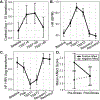Basal testosterone's relationship with dictator game decision-making depends on cortisol reactivity to acute stress: A dual-hormone perspective on dominant behavior during resource allocation
- PMID: 30463044
- PMCID: PMC6379121
- DOI: 10.1016/j.psyneuen.2018.11.012
Basal testosterone's relationship with dictator game decision-making depends on cortisol reactivity to acute stress: A dual-hormone perspective on dominant behavior during resource allocation
Abstract
The dual-hormone hypothesis proposes that testosterone's relationship with status-seeking behavior is moderated by cortisol. However, research testing this hypothesis has focused on basal cortisol; the potential moderating effect of the acute cortisol response to stress has been largely overlooked. The present research investigated the moderating role of cortisol responses to an acute stressor on basal testosterone's link with dominant, status-relevant decision-making. Also, given the multifaceted nature of the response to acute stress, cardiovascular and affective responses to the stressor were examined as alternative moderators of the testosterone-behavior relationship. Participants (N = 112; 56% female) were exposed to a social-evaluative stressor, and their stress responses were measured. Participants subsequently engaged in a one-shot dictator game, wherein they were asked to split money ($10) with a confederate counterpart. The amount of money participants decided to keep for themselves was treated as a metric of dominant status-seeking behavior. For individuals who demonstrated lower cortisol responses to the stressor, basal testosterone was positively associated with more dominant behavior (i.e., keeping more money for oneself), but for those who showed higher cortisol responses, the testosterone-behavior relationship was suppressed. Moreover, other aspects of the stress response (i.e., cardiovascular and affective responses) did not moderate the relationship between basal testosterone and dictator game behavior. These results provide unique support for the dual-hormone hypothesis using markers of stress-induced cortisol change. The findings also suggest that the antagonistic effects of stress on testosterone's role in motivating status-relevant behavior may be specific to cortisol's role in the acute stress response.
Keywords: Cortisol; Dictator game; Dominant behavior; Dual-hormone hypothesis; Stress; Testosterone.
Copyright © 2018 Elsevier Ltd. All rights reserved.
Conflict of interest statement
Conflict of interest and Financial disclosures: The authors report no financial interests or potential conflicts of interest.
Figures



References
Publication types
MeSH terms
Substances
Grants and funding
LinkOut - more resources
Full Text Sources

